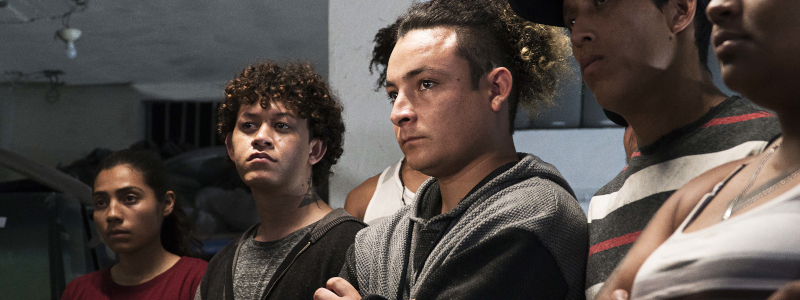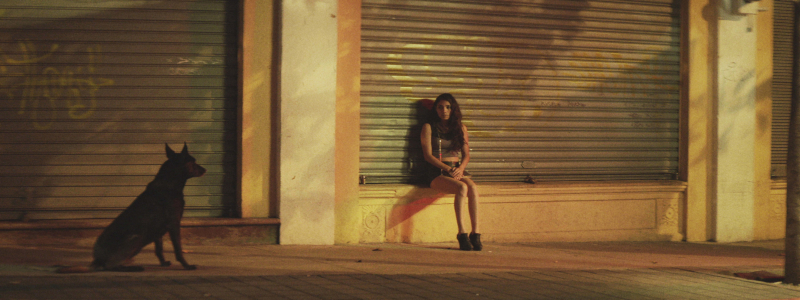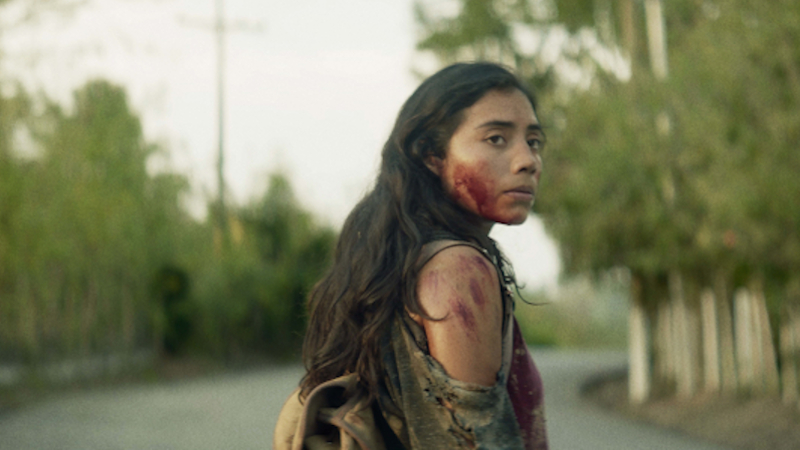Director – Justin Lerner – 2023 – Guatemala, US, Mexico – Cert. 15 – 125m
*****
A young woman infiltrates a drugs gang in order to find out what happened to her elder sister, who never came back from a night out – out in UK cinemas on and on demand Friday, August 23rd
This opens with a deceptively simple sequence of two young women getting ready to go out for an evening. The older one, who apparently goes out a lot, and we’ll later learn is called Bea (newcomer Pamela Martínez), is pressurising the younger one Sarita (Karen Martínez from The Golden Dream, Diego Quemada-Diez, 2014), who has never been out to a club before. They might be flatmates, but as the scene plays out, it emerges that they are sisters. Bea helps Sarita dress up.
While this may sound banal, it’s shot in a long take, and there’s something utterly compelling about it. Perhaps it’s the script, which appears to do everything it needs to with no flab or wastage. Perhaps it’s the casting: you absolutely come to believe these two are sisters (as far as I can tell, despite having the same surname and looking quite similar, the two actresses are not real life sisters). Perhaps, for a male viewer at least, it’s a fascinating glimpse into a female world. Most of us pretty much know how those of our own gender operate, but the other gender can be a complete mystery.
Five minutes in, and the film has completely won me over. It could equally easily screw up further along the line and lose my attention, yet it’s so masterfully put together, in much the same manner as that opening scene, that for the next two hours, it never does. And the plot has barely kicked in at this point.

The pair go out to a club, where it’s immediately obvious that Sarita can handle herself well when she tells two overbearing men coming on to her to fuck off. Alcohol is consumed and dancing ensues, then Bea goes off to confront her boyfriend Andrés (Rudy Rodriguez). Sarita covertly watches him slap her around. She decides to call it a night and leaves, phoning her rich boyfriend Agustin (Esteban Reynoso) for a lift home in his expensive car.
The next morning, Bea hasn’t come home. Sarita and her grandma (Yolanda Coronado) report the missing girl to the local police at the station, who don’t seem particularly concerned. Apparently, girls disappear all the time in Guatemala City, and the cops don’t really care.
So Sarita decides to take matters into her own hands. She starts shadowing Andrés, watching him get rid of an obnoxious, drunk male patron at the bar. Although Agustin won’t even let her in to the gated community with a security guard where he lives with his wealthy parents, she manages to crash a party in his house and guilt trip him into giving her a wad of money which she uses for a bus to the coastal town of Puerto Barrios where Andrés is involved with a clica, a gang of young people engaged in drugs dealing, prostitution and murder.

She infiltrates the clica, meets his immediate superior Damian (Brandon López, also from The Golden Dream) and, posing as a girl who wants to join, is tested to see whether she can be of use to the gang, for which purpose she agrees to be the sexual bait in an assassination attempt on Oliveiros (Juan Pablo Olyslager from La Llorona, Jayro Bustamante, 2019), a man the gang have been trying to kill for months…
Knowing that her sister has disappeared and is likely dead – she will learn what happened later in the narrative – Sarita is entering a world where human life is cheap and a wrong move at any time could cost her her life.
Although the film was scripted by Lerner following much research into clica culture – and you can feel the considerable extent of that research in the piece’s verisimilitude, bolstered by the fact of a number of the young cast having got out of that world themselves – its effectiveness derives from its smart use of mythic archetypes exploring life and death issues. Sarita is completely driven in her search to find, or at least uncover, the truth about what happened to her sister. Yet although you can feel the solidity of a script underpinning everything, Lerner possesses a very real skill in getting his cast to improvise in front of the camera, which has the effect of making everything that’s going on seem all the more real.

The narrative plays an extremely adroit game of cat and mouse with the audience, constantly outwitting the viewer. It’s almost impossible to know where the story is going to go next (except that it’s completely and utterly character-driven). So much so that, at about a quarter of an hour from the end, you’ll still be wondering what direction the last bit of the film will take, and when you realise where it’s going, it will surprise you.
Right at the end, there’s a breathtaking, lengthy, final shot which may be one of this year’s most bravura moments of cinema. It goes on for maybe five minutes as the end credit roll. I won’t tell you which character survives at the end, but suffice to say, for me, my attention was completely held by this shot. It could well be up there with the opening shot of Touch of Evil (Orson Welles, 1958), which similarly had credits over it. Or the lengthy, static shot where Alida Valli walks past Joseph Cotten without saying a word at the end of The Third Man (Carol Reed, 1949). Or the shot of Bob Hoskins thinking in the car at the end of The Long Good Friday (John Mackenzie, 1980).
Another area in which the movie is extraordinary is in its use of music. For which read, found music – music juxtaposed against the moving images that takes them to a whole other level. Quentin Tarantino has always been very good at this, and Wong Kar-wai is even better at it. The current film is in the Wong Kar-wai class in this regard.

I had already decided this would be among my top films of the year when I decided to look up the title. A cadejo, it turns out, is a dog spirit in Guatemalan folklore. The black one is a bad spirit and a white one is a good spirit. Suddenly I realise that, in the middle of her quest, Sarita runs across a black dog; towards the end of the film, she encounters a white one.
There’s therefore a whole other resonance to the proceedings to which I hadn’t hitherto cottoned on. This sets up a whole gamut of cinematic resonances, everything from White Dog (Sam Fuller, 1982) through Collateral (Michael Mann, 2004) to White God (Kornél Mundruczó, 2014) and, to a lesser extent, the less impressive Black Dog (Guan Hu, 2023). Suddenly this movie appears even more impressive than I thought on first viewing it. To reiterate, one of the year’s best.
Cadejo Blanco is out in cinemas and on demand in the UK on Friday, August 23rd.
Trailer:
